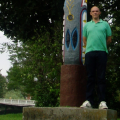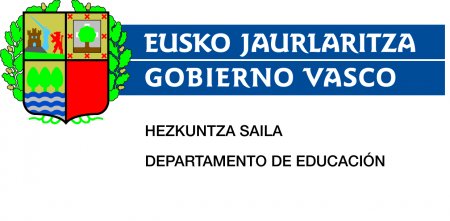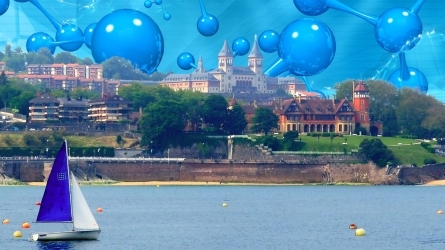
Del Oeste norteamericano a las aulas: interculturalidad, literatura, artes
Description
El Curso de Verano tiene como objetivo fundamental el de exponer la relevancia y pertinencia de la literatura, la cultura y las artes norteamericanas como ejemplo de la representación de la interculturalidad y la diversidad racial contemporánea, con el fin último de su aplicación didáctica en el aula. Este Curso se plantea tras la celebración del Curso de Verano "Multiculturalidad, Literatura y Arte: Del Oeste Norteamericano a las aulas" el pasado 2021. Esta nueva edición tiene entre sus objetivos el extender los contenidos, las perspectivas y el alcance del material propuesto en la pasada edición.
Así, el curso comenzará con la exposición la representación de conceptos tales como “el mito del Oeste” en las artes, como paradigma de la multiculturalidad y de la diversidad étnica. A continuación, las sesiones se se desarrollarán en torno a dos grandes ejes temáticos;
Por un lado, se abordarán las "VOCES" de aquellas comunidades consideradas "no-privilegiadas" en el Oeste Norteamericano a consecuencia de su "Otra" etnicidad. Se propondrá, así, una visión panorámica de la realidad socio-histórica de las comunidades chicana, afro-americana, nativo-americana, asiático-americana y vasco-americana, así como de su producción literaria y artística.
Por otro lado, se expondrán las "FORMAS" en las que estas comunidades han expresado y puesto en valor su diferencia. En este sentido, abordaremos la producción artística realizada desde y sobre el Oeste americano en sus diversas formas: literatura, cine, cómic y música.
En términos generales, se propone una aproximación a la realidad socio-étnica norteamericana a través de su producción artística y cultural. De este modo, se pretende abordar la situación socio-histórica de estas comunidades, así como proponer bibliografía de carácter diverso, con el fin de que sea empleado en el aula para abordar la interculturalidad y la diversidad étnica de nuestra sociedad actual.
Objectives
Ofrecer una aproximación a la historia y a la realidad contemporánea de los Estados Unidos de América, en particular al Oeste Norteamericano, y a su diversidad étnica y cultural, como paradigma de lo intercultural.
Exponer una aproximación teórica a la construcción de la diferencia étnica en Estados Unidos, englobada en el marco de los estudios étnicos y de género.
Exponer la relevancia del arte (Literatura, Cine, Televisión, Música, Cómic, etc) en la representación y transmisión de una realidad diversa y e intercultural.
Ofrecer un repositorio de material bibliográfico relacionado con la representación de la interculturalidad y la diversidad étnica y de género en los Estados Unidos (en particular, en el Oeste Norteamericano), con el fin de que sea empleado en el las aulas de diferentes etapas del proceso educativo, y en el de Secundaria, en particular..
Proponer una reflexión en torno a la relevancia de la utilización de la producción cultural (literatura, cine, televisión, música) para abordar la diversidad multicultural de las aulas de secundaria en el entorno pedagógico vasco-español actual.
Activity directed to
- University student
- Students not from university
- Teachers
- All public
Program
27-06-2022
Registro
Presentation by the Director of the activity
- Amaya Ibarraran Vigalondo | Universidad del País Vasco/Euskal Herriko Unibertsitatea - Profesora Titular Universidad
“El Oeste americano y su proyección en la literatura europea“
- David Río Raigadas | Universidad del País Vasco/Euskal Herriko Unibertsitatea - Catedrático de Universidad
“Resistencia y relacionalidad en las literaturas nativo-americanas: lecciones para el presente“
- Silvia Martínez Falquina | Universidad de Zaragoza - Profesora Titular Universidad
Break
“La literatura y el arte chicanxs como paradigma de la interculturalidad y el mestizaje“
- Amaya Ibarraran Vigalondo | Universidad del País Vasco/Euskal Herriko Unibertsitatea - Profesora Titular Universidad
“Multiculturalidad y cultura afroamericana en el Oeste: de Harlem a Watts “
- Juan Ignacio Guijarro González | Universidad de Sevilla - Profesor Titular Universidad
“Nuevos giros interculturales en la tradición de la "novela de adolescentes" (young-adult fiction) en el Oeste americano“
- Aitor Ibarrola Armendáriz | Universidad de Deusto - Catedrático Universidad
Synthesis
28-06-2022
“Far Westeko Ahotsak: Cine, Arte, Música“
- Monika Madinabeitia Medrano | Mondragon Unibertsitatea - Profesora Contratada
“Música Popular e Interculturalidad: la banda sonora del Oeste Americano“
- Angel Chaparro Sainz | UPV/EHU - Profesor Adjunto Universidad
Break
“Westerns, post-Westerns y multiculturalidad“
- jesus angel González López | Universidad de Cantabria - Profesor Titular Universidad
“Los nativos americanos en el cómic del oeste“
- Francisco Manuel Saez de Adana Herrero | Universidad de Alcalá - Profesor TItular Universidad
Round table: “Una aproximación didáctica e intercultural al Oeste norteamericano: voces y formas“
- Amaya Ibarraran Vigalondo | UPV/EHU - Profesora TItular Universidad (Moderator)
- David Río Raigadas | UPV/EHU - Catedrático de Universidad
- Angel Chaparro Sainz | UPV/EHU - Profesor Adjunto Universidad
- Monika Madinabeitia Medrano | Mondragon Unibertsitatea - Profesora Contratada
- Aitor Ibarrola Armendáriz | Universidad de Deusto - Catedrático Universidad
Synthesis
Directors

Amaya Ibarraran Vigalondo
UPV/EHU
Amaia Ibarraran-Bigalondo is a lecturer o Amaia Ibarraran-Bigalondo is associate professor at the University of the Basque Country, where she teaches contemporary North American Literature and Culture. Her research focuses on the study of Chicana Literature and Culture. Her work has appeared in books, edited books and international journals. Her latest publications include "The New American West: A Journey Across Boundaries in Literature and the Arts" (Routledge, 2020), "Mexican American Women, Dress and Gender: Pachuchas, Chicanas, Cholas" (Routledge, 2019) and the co-editions/editions "The Neglected West" (Portal, 2012), "Transcontinental Reflections on the American West: Words, Images, Sounds beyond Borders" (Portal, 2015). She is a member of the REWEST research group (Research Group in Western American Literature).
Speakers

Angel Chaparro Sainz
Angel Chaparro Sainz was born in Barakaldo, Spain, in 1976. He holds a degree in English Philology from the University of the Basque Country (UPV/EHU) and a Ph.D. from that same university. He is presently teaching at the UPV/EHU in the Translation Studies and in the English Studies programs. His book Parting the Mormon Veil: Phyllis Barber’s Writing was published by the Biblioteca Javier Coy in 2013. He also co-edited the book Transcontinental Reflections on the American West: Words, Images, Sounds beyond Borders in 2015. He has also published in journals such as Miscelánea, Odisea, Lectora, Vasconia or Women’s Studies. His research deals mostly with Western American Literature, Mormon literature, ecocriticism, feminist studies and translation studies, even though he is also interested in a variety of topics dealing with poetry, popular music and minority literatures in general

jesus angel González López
JESÚS ÁNGEL GONZÁLEZ is a professor of English at the University of Cantabria, Spain, where he teaches English and American literature. He holds an M.A. in Spanish from the Pennsylvania State University and a Ph.D. in English from the University of Salamanca, Spain. He has published La narrativa popular de Dashiell Hammett: Pulps, Cine y Cómics (Valencia University Press, 2002), co-edited The Invention of Illusions: International Perspectives on Paul Auster (Cambridge Scholars, 2011) and written a number of articles on American Literature and Film, which have been published in Literature/Film Quarterly, Comparative American Studies, The Journal of Popular Culture, Atlantis, Western American Literature and The Journal of Transnational American Studies. His most recent research deals with the American West and its effects on American and international culture, literature and film.

Juan Ignacio Guijarro González
Juan Ignacio Guijarro is Professor of English and North American Literature at the University of Seville. He earned a master's degree in Hispanic Studies from Northwestern University in Chicago. There he was a Spanish reader and a visiting professor at the University of Nebraska. He is a member of the Research Group on North American Studies at the University of Seville and a member of the editorial board of the Revista de Estudios Norteamericano. As a researcher, XX. and XXI. He has focused on his relationship with 20th century literature and other arts, such as music and film. He has also studied African American literature and cultural relations between Spain and the United States.

Aitor Ibarrola Armendáriz
Aitor Ibarrola-Armendariz teaches courses in ethnic relations, diversity management, academic writing and film adaptation in the Modern Languages and Basque Studies Department of the University of Deusto, Bilbao. He has published articles [in Atlantis, IJES, Miscelánea, Revista Chilena de Literatura, etc.] and edited volumes [Fiction and Ethnicity (1995), Entre dos mundos (2004), Migrations in a Global Context (2007), On the Move: Glancing Backwards to Build a Future in English Studies (2016] on minority and immigrant narratives and processes of cultural hybridisation. He has been the Director of the Erasmus Mundus MA Programme in Migrations and Social Cohesion (2010-14) and Head of the Modern Languages and Basque Studies Dept. (2012-15) in the School of Social Sciences and Humanities at the University of Deusto. Currently, he is preparing a book on trauma and ethnicity, and also involved on a project on diasporic identities.

Monika Madinabeitia Medrano
Monika Madinabeitia is an associate professor at the Faculty of Humanities and Education Sciences (Mondragon University). She is currently the co-coordinator of the recently launched degree Global Digital Humanities, which is located in Zorrotzaurre, Bilbao. She published the illustrated book Petra, My Basque Grandmother in 2018. Her main research areas are identity and e/migration, with an emphasis on the Basque American diaspora in the US West. Her teaching mainly focuses on culture and identity. She has been teaching Basque Culture to international students since 2007 and has participated in different courses and lectures held by Etxepare Institute. Madinabeitia was the guest lecturer at this year´s Eloise Garmendia Chair (2021) and was also one of the main organizers of the international seminar UniverCity: Educating For and With the City, in Bilbao (2019). She is now working on the second edition of UniverCity.

Silvia Martínez Falquina
Silvia Martínez Falquina is associate professor of English Philology at the University of Zaragoza (Spain), where she teaches American literature. Her research specialty is native, ethnic and women's literature in the US. Her publications include Indias y fronteras: el discurso en torno a la mujer étnica (KRK, 2004, winner of the 1st AUDEM Award for Young Researchers); the co-editing, with Bárbara Arizti, of On the Turn: The Ethics of Fiction in Contemporary Narrative in English ; from Stories Through Theories/ Theories Through Stories: North American Indian Writing, Storytelling, and Critique , with Gordon Henry and Nieves Pascual-Soler; and Beneath the Waves: Feminisms in the Transmodern Era, a special issue of The European Legacy, with Silvia Pellicer-Ortín and Bárbara Arizti. She has been editor of Miscelánea: A Journal of English and American Studies. She has recently been elected to be part of the AEDEAN board.
David Río Raigadas
DAVID RIO is Professor of American Literature at the University of the Basque Country (UPV/EHU) in Vitoria-Gasteiz (Spain). He is the author of El proceso de la violencia en la narrativa de Robert Penn Warren (1995), Robert Laxalt: The Voice of the Basques in American Literature (2007) and New Literary Portraits of the American West: Contemporary Nevada Fiction (2014). He has also co-edited five volumes on the literature of the American West and the special issue of the journal Western American Literature on “Writing the Global Western” (2019). David Rio coordinates an international research group (REWEST) specialized in the literature and culture of the American West.

Francisco Manuel Saez de Adana Herrero
Francisco Saez de Adana is a professor at the University of Alcala and director of the Franklin Institute at the same university. He holds a PhD in Telecommunications Engineering from the University of Cantabria and a PhD in Communication from Pompeu Fabra University, with a dissertation on the work of Milton Caniff, which had an impact on American society in the 1930s and 1940s. He recently published the book Una historia del cómic norteamericano in Los Libros de la Catarata. In the field of comic studies, he has published book and article chapters in Studies in Comics, Journal of Graphic Novels and Comics, and Journal of Popular Culture. He has coordinated three issues of Tebeosphere magazine and is a member of the board of CuCo magazine. Comic Notebooks. He is also a member of the Publishing Committee of the journals Studies in Comics and Sequentials and the Advisory Board of Neuroptics. Coordinates a teaching-innovation team that innovates in comics in higher education "
Registration fees
| Face-to-face | Until 27-06-2022 |
|---|---|
| 80,00 EUR | |
| 68,00 EUR | |
| 56,00 EUR | |
| 68,00 EUR | |
| 68,00 EUR |
| Live online | Until 27-06-2022 |
|---|---|
| 68,00 EUR | |
| 80,00 EUR | |
| 56,00 EUR | |
| 68,00 EUR | |
| 68,00 EUR |
Venue
Miramar Palace
Pº de Miraconcha nº 48. Donostia / San Sebastián
Gipuzkoa
Miramar Palace
Pº de Miraconcha nº 48. Donostia / San Sebastián
Gipuzkoa





